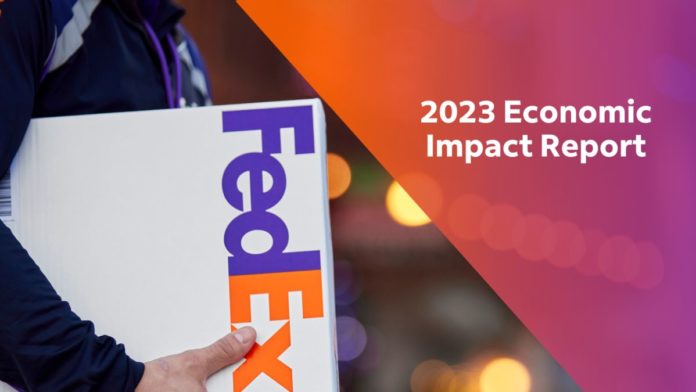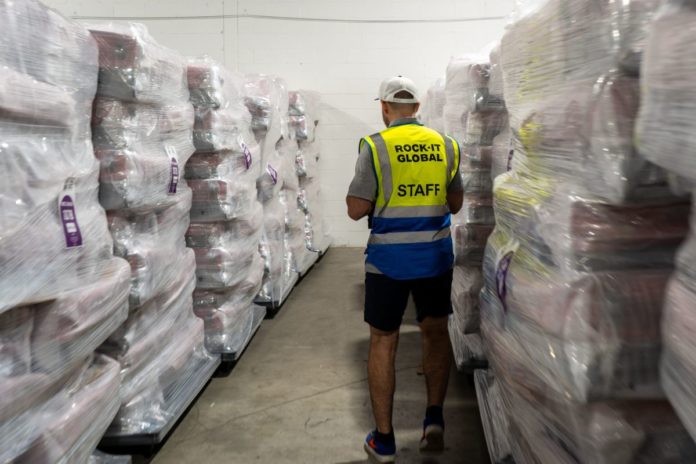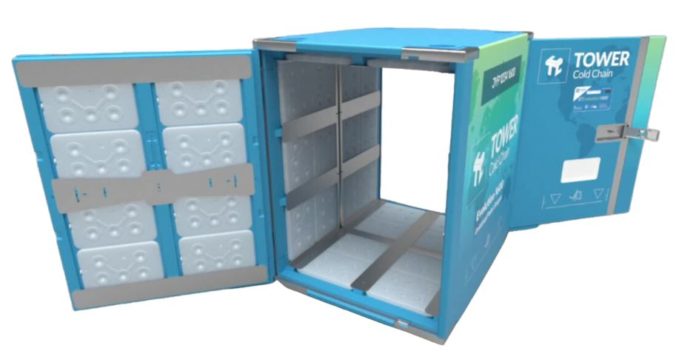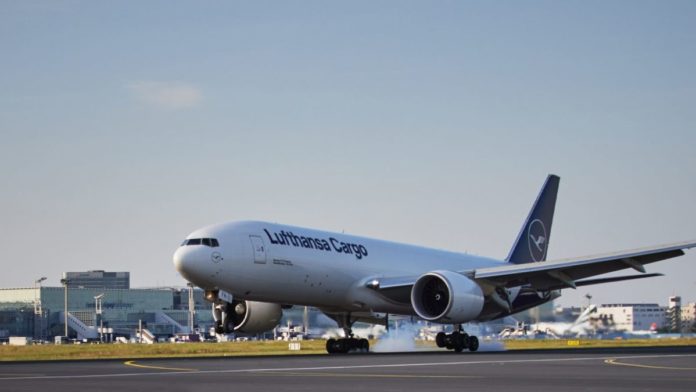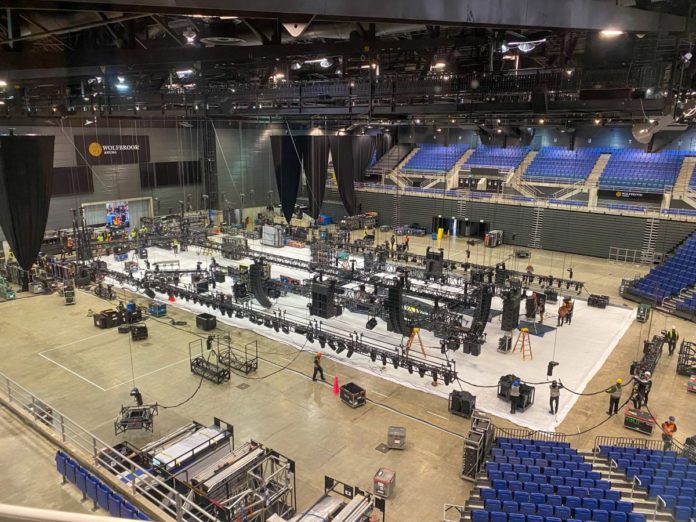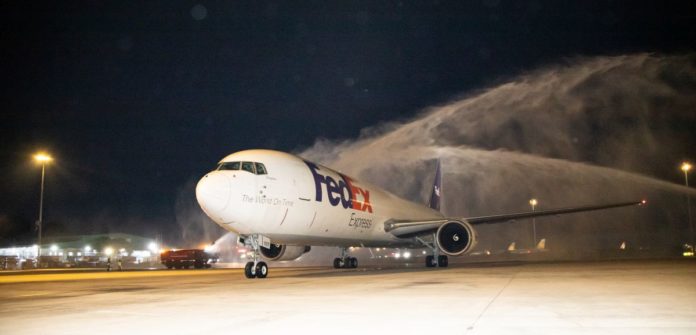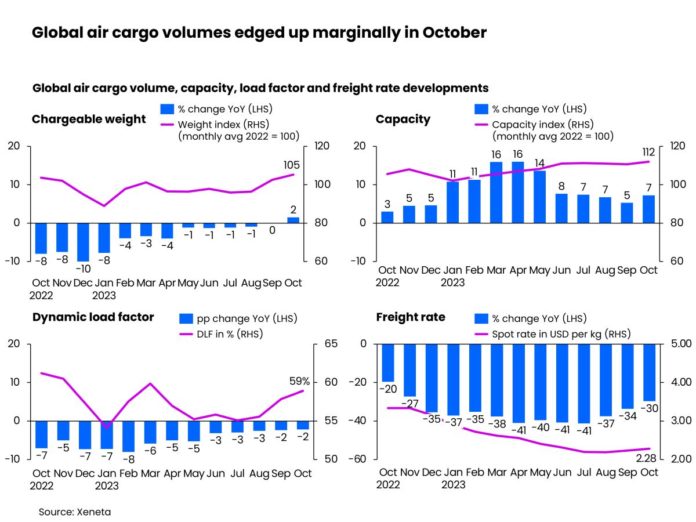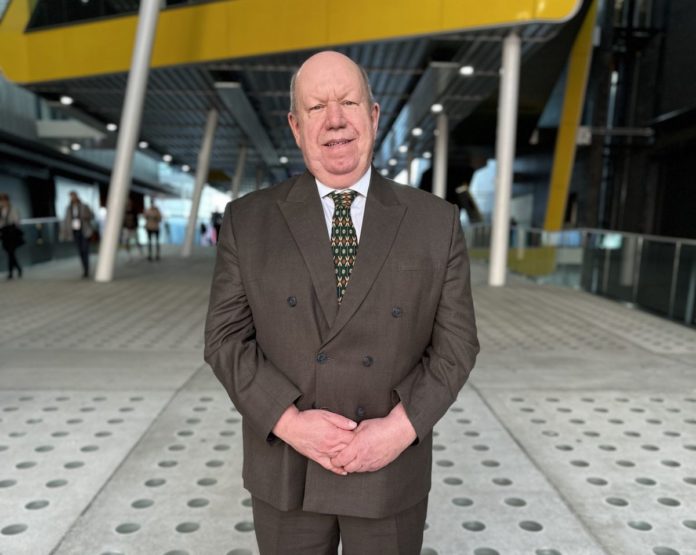Air Charter Service has opened an office in New Delhi, its second office in India and 33rd globally. The company opened its Mumbai office almost 12 years ago and last year enjoyed one of its best years in terms of charter numbers in India. The new office is headed by Aman Arora (pictured, front centre), who moves from his managerial position in Mumbai.
FedEx effect adds $80 billion to global economy
FedEx directly contributed more than $80 billion to the global economy in the 2023, financial year despite recent economic pressures, according to the express and logistics company’s annual economic impact report, released on 6 November.
Produced in consultation with data and analysis firm Dun & Bradstreet, the study demonstrates the positive impact FedEx has on individuals and communities around the globe, which it calls the ‘FedEx Effect.’
In Europe, the company’s impact included $2.4 billion in indirect contributions to the regional economy.
FedEx, which celebrated 50 years of operations on 17 April, claims the most extensive transportation network in the world, providing services to more than 220 countries and territories. It employs over 500,000 people across more than 5,000 facilities and moves approximately 14.5 million packages every day.
FedEx contracted with roughly 100,000 suppliers in FY 2023 — 90% of which were small businesses. It also continued to support trade policies favouring greater market access and efficiency such as de minimis customs allowances, which enable individuals and businesses of all sizes to import low-value goods without duties and taxes.
FedEx Express serves more than 45 countries in Europe, with air hubs at Roissy-Charles De Gaulle Airport in Paris, France and Liège Airport in Liège, Belgium.
fedex.com/economicimpact
Rock-it men get Team Canada to Chile
Global Critical Logistics’ events specialist arm, Rock-it Global has handled the logistics for Team Canada at the 2023 Pan American Games in Santiago, Chile.
Rock-it transported food, medicine, and sporting equipment ranging from hockey sticks to sailing boats for the games, which started on 20 October. It also handled all customs, carnets, and tariffs arrangements and exemptions for the importation of goods, working with various government agencies.
Rock-it’s director, sports and broadcast, Josh Gordon, said: “Rock-it transports anything that helps the athletes feel at home, whether that be their favourite cereal bar, furniture, weight training equipment, or more obscure things like team signage and games for the athletes’ lounge. The cargo we’ve had to move comes in a range of sizes and shapes.”
The Rock-it team has been preparing for Santiago 2023 for over a year, with team members scouting the 12 event venues, driving through each route to identify potential risks or challenges, drawing up solid contingency plans, and arranging insurance coverage.
However, as Adam Tubaro, director sports and broadcast logistics, pointed out, having a ‘Plan B’ is vital: “Things on the ground rarely go as planned, and we have the advantage of being flexible and agile when contingencies need to be activated.”
Tower unveils US- and EU-compatible unit
Tower Cold Chain is offering a new lightweight temperature controlled container compatible with US and EU standards. The Evolution 1600 Tower Universal Pallet is a quarter of the size of a PMC pallet, allowing four containers to be transported per pallet. Following detailed analysis, Tower has reduced the amount of phase-change materials required to maintain a consistent internal temperature, resulting in significant weight savings and more space for product to be packed.

Lufthansa offers fastest-yet service
Lufthansa Cargo is offering a new high-speed cargo option. Td.Zoom is the fastest service for the most urgent shipments and is in addition to the existing td.Pro and td.Flash otpions.
The carrier claims “the fastest capacity access with no weight or size limitations” with special handling processes at its Frankfurt, Munich and Vienna hubs, with ramp supervision during aircraft loading and unloading, dedicated ramp transfer between the warehouse and aircraft as well as ‘tail-to-tail’ transfer on demand. The offer also includes 24/7 personal td.Zoom Customer Service to proactively monitor shipments.
A shipment from Shanghai via Frankfurt to Zurich takes 23 hours with td.Zoom compared with 45 hours with td.Pro and, 35 hours with td.Flash.
Customers can book Add-on Services such as Sustainable Choice at any transport speed to reduce the CO2 emissions of their shipments.
Former pilot takes flight at Maastricht
Maastricht Aachen Airport in the Netherlands has appointed former Croatian Air Force pilot Dean Boljuncic to head up its new sales department. He will draw on his experience as head of aviation development and partnerships at Eindhoven After leaving the Air Force, he held various roles at Pula Airport, and graduated with a master’s degree in Aeronautics.
Global Critical buys in New Zealand
US-based Global Critical Logistics (GCL) has acquired Time Frame Logistics in Auckland and Wellington-based Xtreme Forwarding.
Time Frame’s assets and business will be fully integrated into GCL’s existing Rock-it Global subsidiary and will be branded as Rock-it Global New Zealand.
Xtreme Forwarding will continue operating under its current brand alongside its Dynamic International arm, another GCL company serving film and TV customers.
Founded in 2001, Time Frame specializes in music touring production gear, camera kits, live broadcasting equipment, theatre shows, stadium events, and special projects with complex needs.
Xtreme Forwarding has over 42 years in the film and entertainment industry and offers integrated freight services to a global clientele.
Fed-Ex adds Vietnam-Europe flights
FedEx Express (FedEx) is to introduce a four times a week B767 freighter service from Ho Chi Minh City, Vietnam to Europe via its Asia Pacific Hub in Guangzhou, China. It will reduce delivery times from Southern Vietnam to two business days in many cases. Along with existing flights via Singapore and the current evening flight through the Asia Pacific Hub, FedEx will offer total of nine weekly flights from Ho Chi Minh City.
Christmas cheer in short supply
Global air cargo volumes and spot rates edged up marginally in October, but overall demand remained muted, diminishing hope of a traditional year-end revenue boost, according to Xeneta’s latest analysis.
Latest industry data shows a 2% month-over-month improvement in airfreight volumes in October, which was sub-seasonal compared to the previous five years, while general air cargo spot rates edged up 2% versus September to US$2.28 per kg, rising above seasonal rates in the opening two weeks of October for the first time since mid-May 2023 before falling back to below the seasonal level.
In comparison to last year, the global air cargo spot rate declined at its slowest pace, -30% in October. This is attributed to the slight uptick in global cargo volumes as well as a slowdown of capacity growth in a month in which global belly capacity returned to its pre-pandemic level, albeit this recovery is varied across major lanes.
Global dynamic load factor, which measures both volume and weight perspectives of cargo flown and capacity available, climbed to 59% in October, but remained 2 percentage points below a year ago. Across the first 10 months of 2023, load factors have been below all the corresponding monthly levels of the last five years, pointing to a persistently weak global air cargo market.
Xeneta chief airfreight officer, Niall van de Wouw, said: “October’s market performance is what we expected to see. It was a marginally busier month but not a cause for much optimism, nor pessimism. Carriers and forwarders are not expecting the market situation to improve significantly until well into the second half of 2024.
“The ongoing situation in Ukraine and now the conflict in Israel and Gaza will only add to these concerns. This is a volatile market. Freight forwarders are still procuring capacity on a short-term basis but are selling more long-term. That’s a risk, but clearly forwarders are not willing to commit to capacity because of so much uncertainty.”
Against this backdrop of a still-soft cargo market, global carriers continued to register declines in their October revenues, down 26% overall from the same month last year. This is also reflected in trends reported in carriers’ latest Q3 results, although October 2023 revenues still outperformed October 2019’s pre-pandemic numbers by 21%.
One reason for the higher-than-2019 revenue is the still wide freight rate spread. High rates for premium and special cargoes remained elevated and not yet fully normalized, while the low rates for general cargoes have nearly gone back to their pre-pandemic levels.
Overall, carriers continued to suffer from rising operating costs. Jet fuel costs remained high. Rising wage rates triggered by high inflation and labour shortages also pushed up operating costs. This is likely to be especially challenging for cargo airlines that do not have the added benefit of passenger revenues.
Spot rates from Europe to the US stood at $1.85 per kg in October, up 7% from a month ago. This is because the market anticipates declines in cargo capacity as space availability on this corridor is highly influenced by carriers’ seasonal passenger schedule adjustments, which began on 29 October this year. At the same time, volume measured in chargeable weight edged up 3% from a month ago. However, this represented a considerable 10% decline from the same period a year earlier.
October air cargo spot rates from China to Europe climbed +14% month-over-month to $3.66 per kg, while Southeast Asia to Europe spot rates rose at a slightly slower pace of 9% to $2.51 per kg in the same period. In comparison, the transpacific market saw these two origins show the reversed trends.
Spot rates from China to the US increased just 10% from a month ago to $4.00 per kg, while spot rates from Southeast Asia to the US jumped a considerable 15% to $3.61 per kg. The rise in spot rate for the latter corridor is mainly driven by a sharp growth in chargeable weight month-on-month.
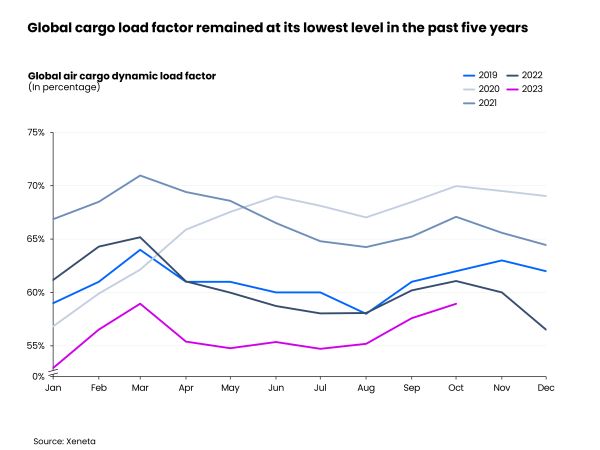
Awery joins Cargo iQ
Awery Aviation Software has joined the air cargo quality standards organization, Cargo iQ. Awery will contribute its expertise in AI, data sharing, and tracking technologies to enhance stakeholders’ collaboration on planning and monitoring air cargo. Longer term, it plans to become a Cargo iQ Data Management Platform provider.
Cargo iQ executive director, Lothar Moehle said: “Awery will support Cargo iQ’s ambition to leverage digital transformation to make end-to-end shipment visibility a reality for all stakeholders – an essential requirement for driving quality in the supply chain.”
“We are keen for them to resume the great work they started during the recent IATA Cargo hackathon.”
Awery was awarded the Cargo iQ Prize at IATA’s ONE Record Hackathon 2023 for its door-to-door airfreight planning and real-time update solution for Cargo iQ members, CargoTracking.aero.








